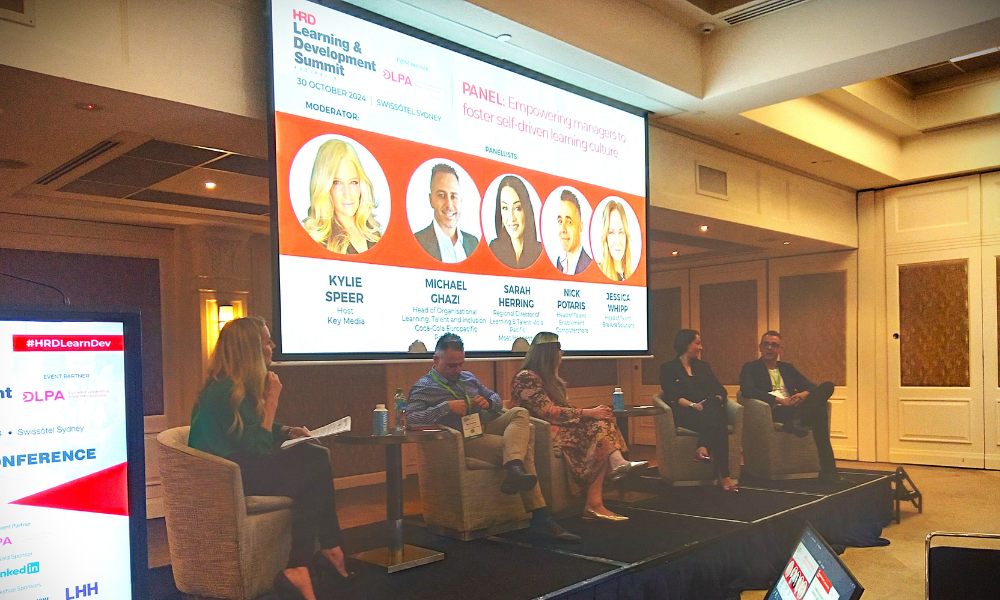
Coca-Cola, Computershare and Bravura Solutions offer valuable insights at HRD Learning & Development Summit

Managers have a lot on their plates. On top of all that, they are expected to keep the troops motivated with learning programs that show there is always room to grow.
But managers need resources and support to do learning and development well. In a world that won’t stop, there’s a strong case for being flexible.
“Companies are changing constantly, so our leaders have to be agile, and there are some critical competencies around that,” said Nick Potaris, head of talent enablement at Computershare, speaking at the HRD Learning & Development Summit on 30 October.
“That determines what your learning culture needs to look like, as well as the solutions you provide and how you provide them.”
At Bravura Solutions, head of talent Jessica Whipp pays attention to making learning part of the performance cycle, so that goals and areas for focus are incorporated into personal learning plans. Then, managers can approach talent review conversations not just looking at a workers’ achievements throughout the year but with an idea of what learning is required to accelerate talent.
“It’s about identifying high performance and high-potentials, and paying attention to retaining those individuals,” she said at the HRD Learning & Development Summit.
At Coca-Cola Europacific Partners, head of organisational learning, talent and inclusion Michael Ghazi said the trick is to keep it simple.
“Learning is lifelong, and it’s an important journey,” he said at the event, “whether that’s through peer learning, coaching circles, storytelling, sharing experiences or great e-learning.”
It helps, Ghazi said, when leaders can “cast a shadow” with role modelling, self-leadership and learning.
Also at the HRD summit, Sarah Herring, regional director talent and learning Asia Pacific at Moët Hennessy, takes a different approach.
“You cannot have a learning culture if you do not have psychological safety,” she said. Stress and learning don’t mix, she said, and managers must understand that if they are to engage in proactive learning.
“If you have zero psychological safety in your workplace, you have no chance of engaging in any type of learning culture.”
If organisations are expecting leaders to create an environment which is psychologically safe, Ghazi said, “then the role of L&D is to help lead and role-model some of those behaviours.”
A classroom approach is OK for children but not for work, Potaris said.
“We’re moving more to an environment where people have to experience things on the job, so work is the way to learning and work is the way to developing. You can’t do that unless you have psychological safety, because you have to fail in order to learn.”
Leaders need to have the ability to coach rather than instruct and direct, said Potaris from Computershare. “It’s a very different leadership style these days – it changes the way the L&D expert is seen.”
When used the right way, L&D can be a “value creator”, Whipp said, influencing behaviours that leaders think could do with a tweak.
“I work with our executives and leaders around what it is they want people to know, to think, to feel and to do as a result of a particular intervention, and looking at the change we want to see in the organisation,” she said.
“Once you’ve got that, it’s pretty easy to design something to achieve those outcomes.”
Expecting managers to be accountable for a learning culture is a big call. After all, one of the hardest jobs is to be a subject matter expert who manages people who are also subject matter experts.
“We’re doing things like 360s and coaching sessions with some of our leaders,” Potaris said. “Psychological safety, for example, or even demonstrating and enabling culture and learning comes from the top and filters down.”
A tough job in HR is helping a manager see that their management or leadership skills could be improved.
“Being a leader is very difficult,” Potaris said. “Giving someone feedback that they’re not such a great leader is also very difficult. You are not going to be able to change unless you realise there’s an issue.”
Coca-Cola has introduced “drop everything and learn” days, Ghazi said, to free-up capacity for leaders to soak up new material.
“We try to make it fun,” he said. “It’s around creating space for them to self-reflect. We set up accountability trios to ensure we keep could leaders accountable – and then it became a cascade approach.”